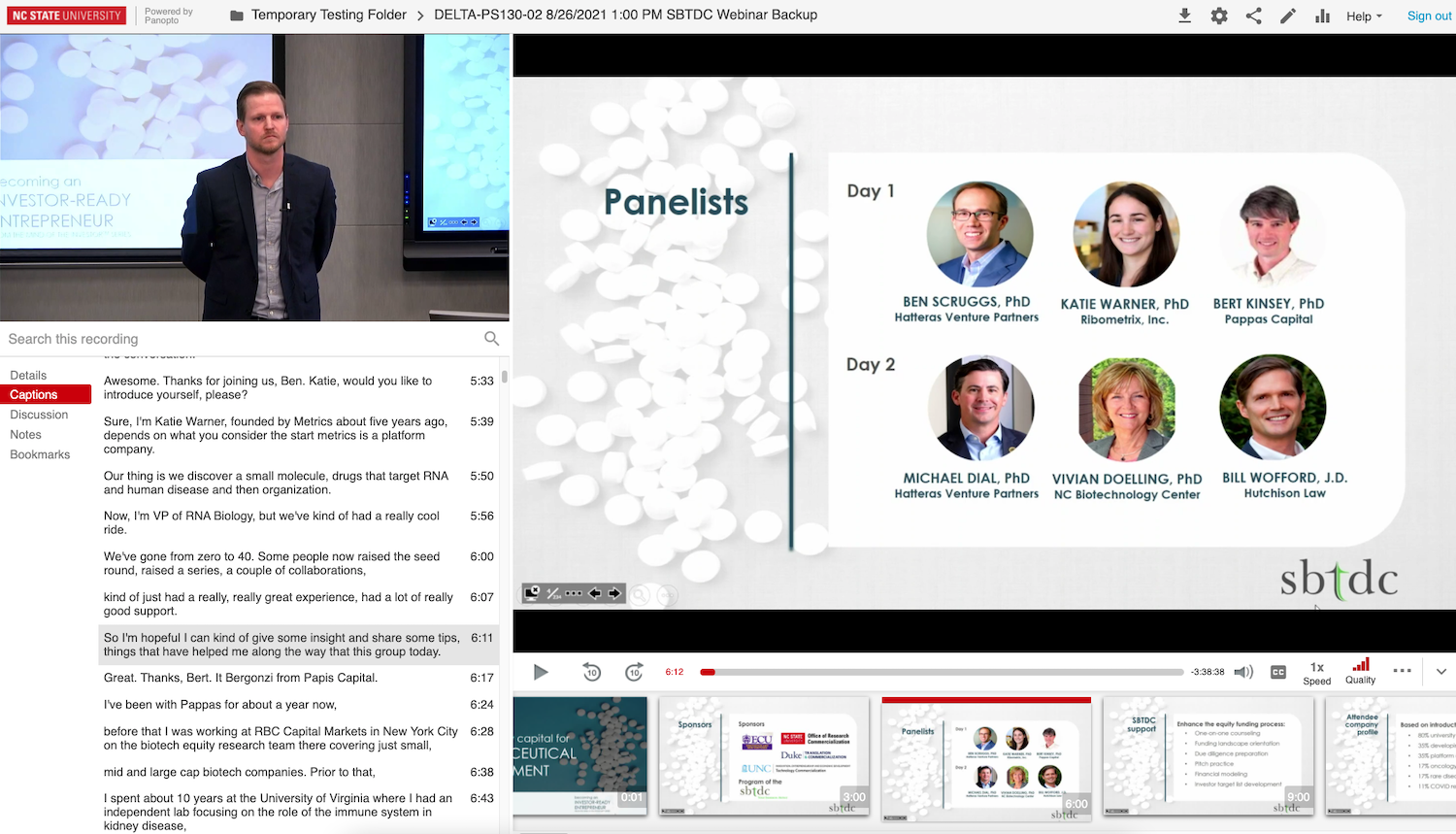Employee Relies on Alma Mater to Transform Workshops for NC SBTDC

Instead of cancelling or postponing the “Becoming an Investor-Ready Entrepreneur” (IRE) workshops due to the pandemic, Technology Commercialization Counselor Mike Carnes and his team successfully pivoted the traditional in-person event to a virtual one with support from DELTA. These workshops are focused on helping early-stage technology entrepreneurs raise investment capital from angel investors and venture capitalists.
Carnes works for the Small Business and Technology Development Center (SBTDC) in the Raleigh Center that is housed on Centennial Campus so it was convenient to collaborate with DELTA. The SBTDC, a unit within NC State’s Office of External Affairs, Partnerships and Economic Development, provides confidential management counseling and educational services to small and mid-sized businesses with most services being free of charge. It is a business and technology extension program of the UNC system and is funded in part through a Cooperative Agreement with the U.S. Small Business Administration with a mission to positively impact the N.C. economy. In fact, the SBTDC provided service to more than 6,000 businesses resulting in 10,000 jobs created and 445 new businesses started in 2020.
In Sept. of 2021, the SBTDC’s Technology Commercialization team added a new version of the IRE workshop that specifically focused on pharmaceutical companies. Since they have major financial burdens and lengthy approval processes, this workshop is quite different from the SBTDC’s standard version IRE workshop.
“I wanted to make sure to take a moment to let you know how awesome the team did in helping us pull these events off. DELTA staff were very professional and accommodating, making it a smooth experience for me as the presenter and organizer,” said Carnes.
What Types of Companies Do the SBTDC Workshops Help?
The SBTDC’s Technology Commercialization team, led by Nicole Schwerbrock, works with all types of companies in technology commercialization, from high-growth companies to spin-out companies that faculty members develop. The IRE workshops have the goal of filling the gap between small companies with great business ideas and investors who could help the companies grow and become profitable. Entrepreneurs need to learn the equity investment process and terminology so they can level the playing field when targeting investors because you only get one chance at a first impression.
When a company is searching for investors, time is of the essence because funding is critical to their survival. Pandemic or no pandemic, they need to reach investors in a timely manner speaking the right language which is exactly what the SBTDC’s workshop helps them to do. Carnes provides rapid-fire presentations on relevant topics while panelists from local venture capital firms as well as angel investors provide commentary on each topic to help entrepreneurs understand how investors evaluate their companies.
DELTA’s Response to Request for Assistance
Carnes was uncertain about how to transition these two events (the inaugural Pharma-focused version this fall and the general angel investor-focused version in Dec. 2020) that hosted over 225 attendees from our local entrepreneurial community into a seamless virtual event. So, he reached out to DELTA’s IT Manager Shawn Colvin for assistance. Colvin’s team has years of experience and determined that they could provide the technological support needed to provide a framework for this event.
Colvin and his team created a seamless virtual event by setting it up as a webinar because of the number of participants. They used Poe Hall 202 for the “Becoming and Investor-Ready Entrepreneur” in Dec. of 2020 as the physical location for Carnes to speak from and they chose GoToMeeting because it felt comfortable to those involved. For this year’s event, they used Park Shops 130 with Zoom as host for the video teleconferencing aspect of the webinar. DELTA manages the Zoom enterprise solution campus-wide, however, their media-rich classrooms are designed to facilitate most video/web conferencing applications.
“The Video Communications Services (VCS) DELTA team worked diligently to streamline the workshop presentation that had six panelists in Sept. of 2021. Darren Ley was onsite to assist with classroom preparation and set-up at Park Shops130. Brandon Joyner provided tech support from our Centralized Control Room (CCR) in Ricks Hall. Bob Klein helped facilitate the Zoom webinar format to ensure that designated panelists and event participants were managed appropriately for the event,” explained Colvin.
So in December 2020, the panelists called in remotely, displaying their images for the video conference, and Carnes was in the classroom while the VCS team member Darren Ley monitored and recorded the video. The workshop fee is $145 and Carnes believes that this year’s attendees got more for their money because the event was recorded and attendees can access it in the future as a reference. Additionally, this is valuable to the SBTDC because it is recorded content that can be shared in the future.
“I felt much more confident presenting this workshop with DELTA’s support because I felt like the DELTA folks had my back. I was able to focus on providing value to the entrepreneurs because I did not need to even think about the technology side of the equation. The DELTA team I worked with was professional, responsible and good at problem-solving,” added Carnes.
Carnes went on to say he believes this has opened doors to a hybrid approach for future workshops. The SBTDC plans to continue to offer these two workshops and they are considering the possibility of adding workshops focused on agricultural biotechnology and agricultural food technology at some point.


